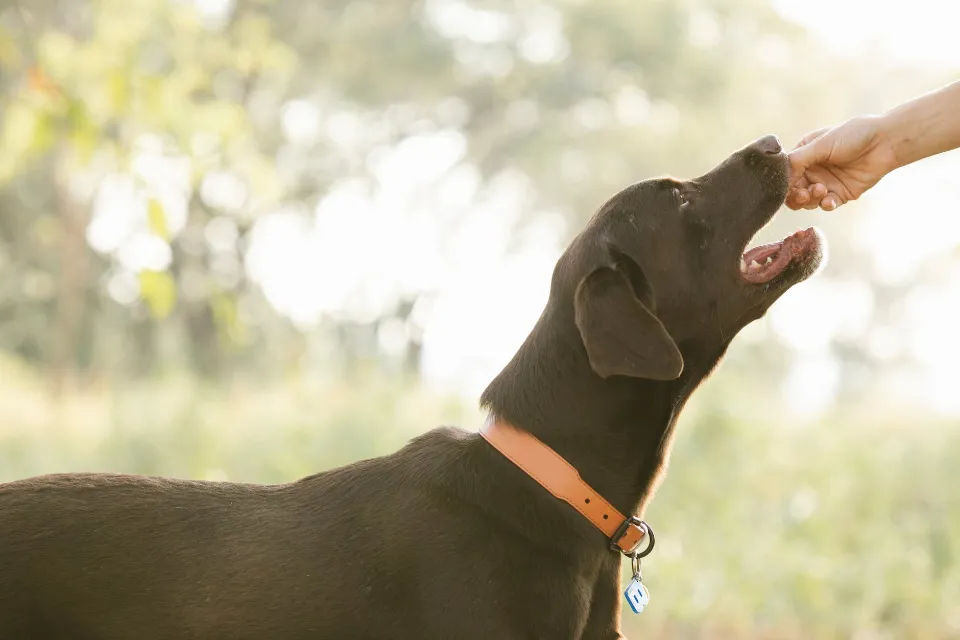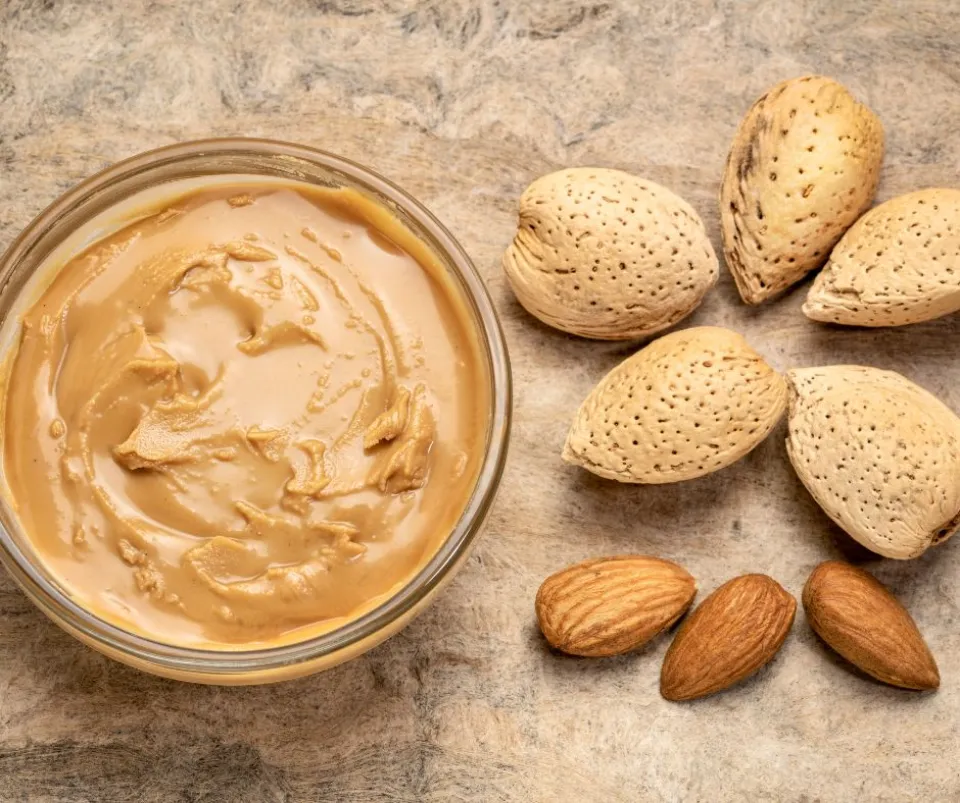Here is everything you need to know about almond butter and your dog so that you will be able to make an informed decision regarding this rich and creamy snack.
Making sure your dog receives the care it needs and deserves is your top priority as a dog owner. Making sure your pet doesn’t unintentionally consume any food that they shouldn’t eat is a key component of that.
Can dogs eat almond butter? If it doesn’t contain any unsafe additives, almond butter isn’t poisonous to your dog. Almond butter is safe for dogs to eat on rare occasions, but you shouldn’t give your dog a lot of it on a regular basis because it’s hard to digest and could upset their stomach.
See what you can do to feed your pet almond butter.
Can Dogs Eat Almond Butter?
Yes, they can. Almond butter is a treat that your pet occasionally enjoys. However, not all dogs are able to digest almonds, despite the fact that they are not toxic to dogs. Until you determine how well your dog tolerates almonds, you should exercise caution.
As a result, even though almonds and almond butter are not completely toxic to pets, you should still think twice before giving them anything that has been heavily laden with nut butter and instead give them a typical treat.
Related:
Nuts are also high in fat. Due to the possibility of an upset stomach in your dog, this is crucial to consider. That’s yet another justification for why it’s crucial to severely restrict how much nut butter your dog consumes. Almond butter is a delicious addition to any meal, and we totally get that!

What Are the Dangers of Almond Butter?
Almond butter is tasty in small doses and is not harmful, but large or repeated doses of almond butter can be harmful.
Some Dogs Can’t Tolerate Nuts
True nut allergies in dogs are uncommon, but they do exist. After your dog consumes any type of nut, watch them closely to make sure they are not in distress.
Due to the fact that dogs’ digestive systems differ from ours and are less capable of breaking down starch or fat as quickly, nuts can be challenging for canine stomachs to digest. Be cautious when introducing nut butter for the first time because it might cause nausea, itchy skin, or upset stomach.
Lots of Fat
Although all nuts are high in fat and make for great snacks for people when consumed in moderation, they can quickly add weight to a dog. In the US, dogs often struggle with obesity. According to the Association for Pet Obesity Prevention, 56% of pet dogs are overweight, which causes joint issues, diabetes, and shorter life spans.
When the pancreas tries to digest itself, pancreatitis, which can also be brought on by high-fat foods, can occur. You definitely don’t want to give it to your dog through high-fat foods because it is agonizing and distressing.

Other Toxic Ingredients
While store-bought versions often contain additional ingredients, which can be a major issue, plain almond butter is safe for dogs. One such ingredient that can be fatal to dogs is xylitol, which in almond butter results in hypoglycemia within an hour.
Macadamia nuts and salt are other potentially harmful ingredients.
How Often Can I Give My Dog Almond Butter?
Dogs shouldn’t consume almond butter in regular amounts, and certainly not daily, due to its high-fat content.
What is appropriate will depend on how well your dog is. They can consume more food than sedentary dogs if they are fit and active. No more than 10% of a dog’s diet should be made up of treat foods, according to the ASPCA.
The remainder should consist of a premium, nutritionally complete dog food that is balanced and contains the right amount of vitamins and minerals for dogs.
According to some experts, small dogs should only consume a teaspoon of almond butter, while large dogs can eat a tablespoon.

Tips to Incorporate Almond Butter into Your Dog’s Diet
Dog owners should take a few things into account before introducing almond butter to their dog’s diet, despite the fact that it has many health advantages for dogs.
- Avoid artificial sweeteners. Xylitol-containing nut butter, such as almond butter, should not be given to pets. This sweetener abruptly lowers the blood sugar levels in dogs, which can result in life-threatening hypoglycemia, pancreatitis, or liver failure.
- Keep portions small. Although almond butter can occasionally be a healthy dog treat, it has a high-fat content and may upset the stomach. You should only feed your dog small amounts of almond butter because large amounts can cause gastrointestinal distress, weight gain, or obesity in dogs.
- Look for simple recipes. If dog owner wants to give their pet almond butter as a treat or incorporate it into homemade dog food, they should look for almond butter that has no added sugar, salt, or preservatives. Pick almond butter that is natural and organic.
- Make your own almond butter. Instead of purchasing store-bought creamy almond butter if your dog enjoys the flavor of it, think about making your own. The presence of sugars, sweeteners, and preservatives in your homemade almond butter that could cause your dog’s stomach upset or other health problems are something you can control.
- Test your dog for allergies. Almond butter can cause an allergic reaction in some dogs, just like peanuts can in some dogs. Before introducing your dog to almond butter for the first time, perform a thorough allergy test on your pet at the veterinarian.
Can Dogs Eat Almonds?

If you have any experience with dogs and almonds, you might be surprised to learn that almond butter for dogs is completely safe. The almonds in almond butter, however, have already been roasted and ground, so this is the reason.
In fact, many nuts are poisonous to dogs if consumed whole and uncooked. For instance, macadamia nuts are extremely toxic to dogs. Dogs who consume even a small amount can become weak, throw up, and even become hyperthermic. If your dog eats black walnuts, they are toxic and can have an adverse effect on their nervous system.
Although not all nuts can result in the severe, potentially fatal symptoms that macadamia nuts and black walnuts can, other uncooked nuts can. Raw almonds, pecans, and cashews are included in this.
Not directly toxic are almonds. Raw almonds can cause an obstruction in the stomach, though most dogs won’t chew the nuts thoroughly before consuming them. Raw almonds can also be a threat to choking in small dog breeds.
Almonds become safe for dogs to eat when they are roasted and then ground, as they are in almond butter.
Conclusion: Can Dogs Eat Almond Butter?
Almond butter can be a tasty treat for dogs and is safe in moderation. When dogs consume large amounts of almond butter or the mixture contains other toxic ingredients for dogs like xylitol, salt, or macadamia nuts, problems arise.
Never give your dog products containing the ingredient xylitol, and stay away from flavoring or sweetening your almond butter. The additive xylitol is poisonous to dogs and can cause hypoglycemia, liver failure, and even death.
FAQs
Is Almond Butter Better Than Peanut Butter for Dogs?
The vitamin B3 in almond butter supports the liver and the eyes as well as helping to keep your dog’s fur strong, healthy, and glossy. Additionally, even more, Vitamin E is more present in it than in peanut butter, which helps your dog’s immune system work better by removing dangerous free radicals from its cells.
What Nut Butter is Good for Dogs?
While almond, peanut, and cashew butter are all safe for your pet to consume in smaller quantities, the same cannot be said for macadamia nuts, pecans, pistachios, or walnuts.
Why Do Dogs Love Nut Butter?
Peanut butter is full of fat, and dogs seem to love the flavor of fat as much as humans do since they do have fat-specific taste buds.





